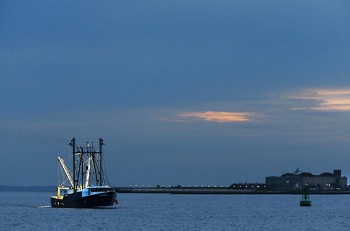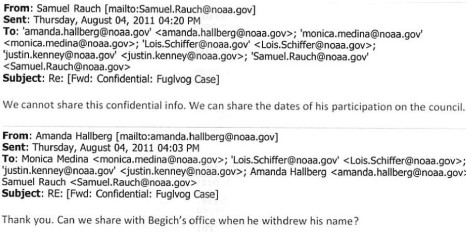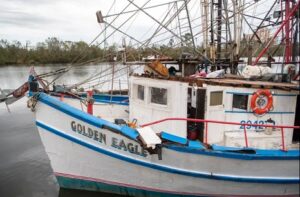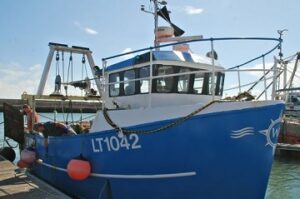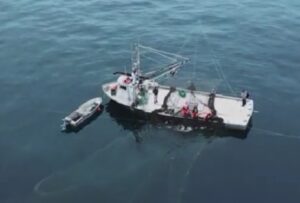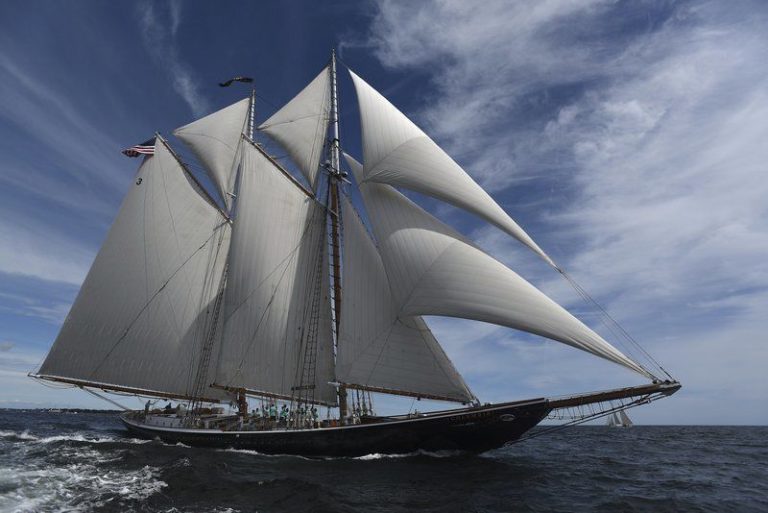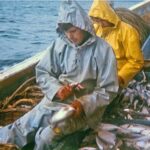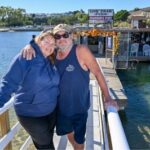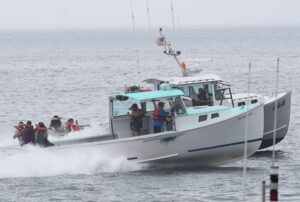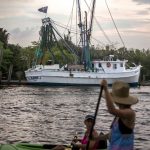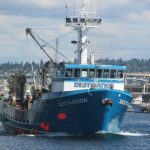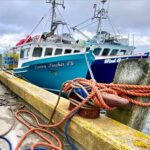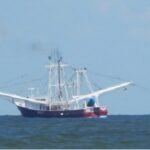Tag Archives: brian-rothschild
SMAST’s Kevin Stokesbury: On scallops, community collaboration, and a lifelong love of the ocean
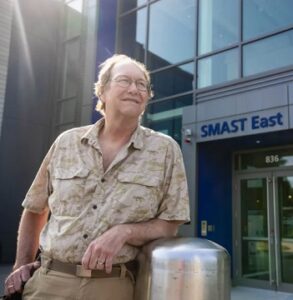 Growing up on the Bay of Fundy in Nova Scotia, Kevin Stokesbury spent as much time as possible swimming, searching for sand shrimp, and soaking up the sun with his siblings. Now as dean of the School for Marine Science and Technology (SMAST) at UMass Dartmouth, he’s finding practical applications for his passion with the sea. Stokesbury has played an integral role in revitalizing the scallop industry in New Bedford, inventing a drop camera in 1999 that snapped photos of scallops living on the seafloor, giving scientists and fishermen much more precise estimates of scallop numbers than previously available. The location map and information accompanying the photographs have proved vital. Stokesbury’s invention has greatly boosted the local economy. Before the drop camera, scallop boats brought in an annual harvest valued around $89 million. In 2021, it was $670 million, according to a NOAA commercial landings report. Video, Photos, >click to read< 17:41
Growing up on the Bay of Fundy in Nova Scotia, Kevin Stokesbury spent as much time as possible swimming, searching for sand shrimp, and soaking up the sun with his siblings. Now as dean of the School for Marine Science and Technology (SMAST) at UMass Dartmouth, he’s finding practical applications for his passion with the sea. Stokesbury has played an integral role in revitalizing the scallop industry in New Bedford, inventing a drop camera in 1999 that snapped photos of scallops living on the seafloor, giving scientists and fishermen much more precise estimates of scallop numbers than previously available. The location map and information accompanying the photographs have proved vital. Stokesbury’s invention has greatly boosted the local economy. Before the drop camera, scallop boats brought in an annual harvest valued around $89 million. In 2021, it was $670 million, according to a NOAA commercial landings report. Video, Photos, >click to read< 17:41
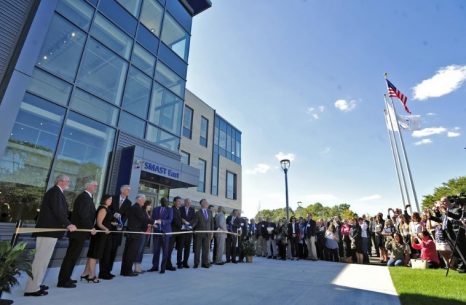
SMAST East opening draws interest nationally
The official opening of the second SMAST facility created ripple effects beyond its location on South Rodney French Boulevard. Construction crews erected SMAST East at a cost of $55 million. The names on the guest list, which packed into the first floor of the 64,000 square foot building Friday, displayed its incalculable value to the SouthCoast. From the political arena, Cong. Bill Keating, Sen. Mark Montigny, Rep. Antonio Cabral and Mayor Jon Mitchell addressed the crowd at the ribbon cutting ceremony. NOAA Fisheries Greater Atlantic Regional Administrator and former New Bedford Mayor John Bullard and former dean of SMAST Brian Rothschild sat in attendance. Eastern Fisheries President Roy Enoksen and Executive Director of New Bedford Seafood Consulting Jim Kendall each listened to the 90-minute presentation that ended with a ribbon cutting. click here to read the story 09:34
New Bedford again tops nation for dollar value of fishing catch
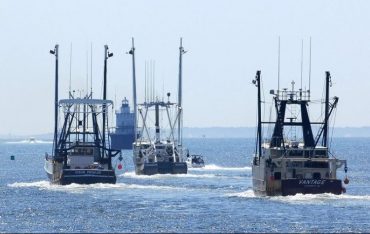 The city’s port has again topped the country for dollar value of its fishing catch, NMFS reported this week, citing 2015 landings worth $322 million. That marks 16 years in a row that New Bedford has held the top-value title, which is thanks largely to scallops. Dutch Harbor, Alaska, again was tops for total volume of catch, landing 787 million pounds last year. “The scallop industry has put New Bedford at the top of the food chain, as it were, of fishing ports for the last 16 years — that’s a very impressive streak,” said Ed Anthes-Washburn, port director for the city’s Harbor Development Commission. “It really shows the impact of scallops but also the impact of cooperative research.” In the 1990s, SMAST scientists Brian Rothschild and Kevin Stokesbury pioneered innovations in counting scallops, with cameras tested and used on local scallopers. The resulting data affected stock assessments by the National Oceanic and Atmospheric Administration (NOAA), ultimately leading to larger catch quotas and helping secure steady catches for waterfront businesses. Read the rest here 19:52
The city’s port has again topped the country for dollar value of its fishing catch, NMFS reported this week, citing 2015 landings worth $322 million. That marks 16 years in a row that New Bedford has held the top-value title, which is thanks largely to scallops. Dutch Harbor, Alaska, again was tops for total volume of catch, landing 787 million pounds last year. “The scallop industry has put New Bedford at the top of the food chain, as it were, of fishing ports for the last 16 years — that’s a very impressive streak,” said Ed Anthes-Washburn, port director for the city’s Harbor Development Commission. “It really shows the impact of scallops but also the impact of cooperative research.” In the 1990s, SMAST scientists Brian Rothschild and Kevin Stokesbury pioneered innovations in counting scallops, with cameras tested and used on local scallopers. The resulting data affected stock assessments by the National Oceanic and Atmospheric Administration (NOAA), ultimately leading to larger catch quotas and helping secure steady catches for waterfront businesses. Read the rest here 19:52
SMAST founding dean, chancellor medal recipient Brian Rothschild, reflects on state of fisheries science
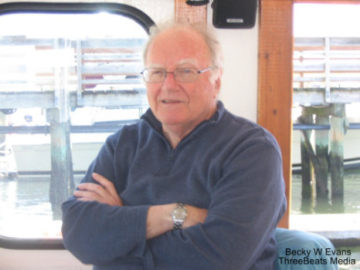 Dr. Brian Rothschild already had a stellar career in fisheries and marine science when he came to the University of Massachusetts Dartmouth 20 years ago to head the fledgling Center for Marine Science, now known as the School for Marine Science and Technology. He built that institution from the ground up, recruiting top talent and developing a strong reputation in the field of fisheries, ocean science, and industry regulations. At 81, he is officially retired, but continues his scientific work unburdened, he says, by the demands of management. Read the interview here 12:06
Dr. Brian Rothschild already had a stellar career in fisheries and marine science when he came to the University of Massachusetts Dartmouth 20 years ago to head the fledgling Center for Marine Science, now known as the School for Marine Science and Technology. He built that institution from the ground up, recruiting top talent and developing a strong reputation in the field of fisheries, ocean science, and industry regulations. At 81, he is officially retired, but continues his scientific work unburdened, he says, by the demands of management. Read the interview here 12:06
Study: Offshore wind’s impacts on fisheries unclear; federal report calls for more research
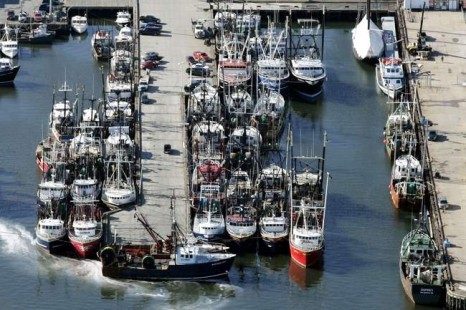 Advocates for regional fishing industries and marine life are concerned about the impacts of offshore wind turbines as deep-pocketed, experienced developers eye construction in ocean waters south of Martha’s Vineyard. The offshore wind industry has been touted as a key piece of New Bedford’s economic future, but advocates’ concerns are reflected in a federal report that says little is known about how turbines could affect fish populations. State Rep. Patricia Haddad, D-Somerset, is sponsoring energy legislation that includes intended to boost turbine development. Read the article here 17:27
Advocates for regional fishing industries and marine life are concerned about the impacts of offshore wind turbines as deep-pocketed, experienced developers eye construction in ocean waters south of Martha’s Vineyard. The offshore wind industry has been touted as a key piece of New Bedford’s economic future, but advocates’ concerns are reflected in a federal report that says little is known about how turbines could affect fish populations. State Rep. Patricia Haddad, D-Somerset, is sponsoring energy legislation that includes intended to boost turbine development. Read the article here 17:27
Boston Fisheries Foundation inducts Dr. Brian Rothschild into Seafood Hall of Fame
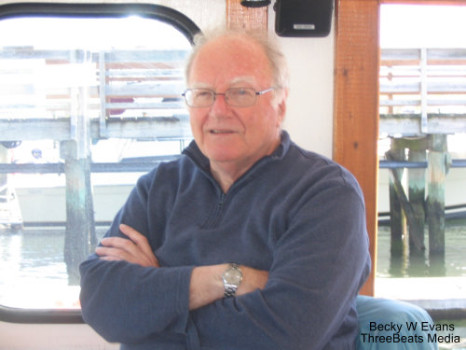 The foundation honored Rothschild at the 2015 Boston Seafood Festival for his distinguished research and leadership in the management and sustainability of local fisheries. “Brian has been a major influence in fisheries management policy for decades at a local and international level,” said Richard Stavis, Boston Fisheries Foundation board member and CEO of Stavis Seafoods. Read the rest here 14:00
The foundation honored Rothschild at the 2015 Boston Seafood Festival for his distinguished research and leadership in the management and sustainability of local fisheries. “Brian has been a major influence in fisheries management policy for decades at a local and international level,” said Richard Stavis, Boston Fisheries Foundation board member and CEO of Stavis Seafoods. Read the rest here 14:00
In the News -SMAST Prof. Emeritus Brian Rothschild Named Hjort Scholar
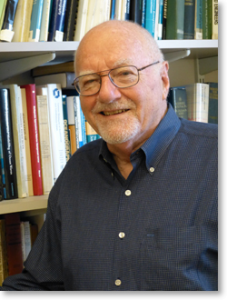 SMAST Prof. Emeritus Brian Rothschild has been appointed a Hjort Scholar by the Hjort Centre for Marine Ecosystem Dynamics, Bergen, Norway. According to the appointment letter, recipients of Hjort Scholarships are “… scientists whose research is deemed to promote scientific innovation and understanding of marine ecosystem dynamics.” He is currently President and CEO of the Center for Sustainable Fisheries (CSF), a science-based, non-profit organization “devoted to the onservation of our fisheries resources and the economic development of our fishing communities.” Read the rest here 12:06
SMAST Prof. Emeritus Brian Rothschild has been appointed a Hjort Scholar by the Hjort Centre for Marine Ecosystem Dynamics, Bergen, Norway. According to the appointment letter, recipients of Hjort Scholarships are “… scientists whose research is deemed to promote scientific innovation and understanding of marine ecosystem dynamics.” He is currently President and CEO of the Center for Sustainable Fisheries (CSF), a science-based, non-profit organization “devoted to the onservation of our fisheries resources and the economic development of our fishing communities.” Read the rest here 12:06
NOAA Reports: New England groundfisheries still struggling
![]() “The report puts every region together with the whole country and calls it a big success, but in New England the groundfishery really isn’t doing well,” said Brian Rothschild, former dean of the School of Marine Science and Technology at UMass Dartmouth. “We still have some real problems in New England straightening out our management picture.” Read more here 08:49
“The report puts every region together with the whole country and calls it a big success, but in New England the groundfishery really isn’t doing well,” said Brian Rothschild, former dean of the School of Marine Science and Technology at UMass Dartmouth. “We still have some real problems in New England straightening out our management picture.” Read more here 08:49
Ruling rejects Massachusetts and New Hampshire challenges over science, economic impact
 “In our brief, we cited Justice (Antonin) Scalia’s view that an amount of deference is a permission slip for an arrogation of power,” said Brian Rothschild, president and chief executive officer of the Center for Sustainable Fisheries, which joined the state of Rhode Island in filing amicus briefs on behalf of the plaintiffs. “The problem is that in cases like this, judges are left with really difficult technical decisions. That’s the reason for the deference.” Read more here 07:35
“In our brief, we cited Justice (Antonin) Scalia’s view that an amount of deference is a permission slip for an arrogation of power,” said Brian Rothschild, president and chief executive officer of the Center for Sustainable Fisheries, which joined the state of Rhode Island in filing amicus briefs on behalf of the plaintiffs. “The problem is that in cases like this, judges are left with really difficult technical decisions. That’s the reason for the deference.” Read more here 07:35
State targets NOAA science, tactics in its most recent filing of its lawsuit against federal fishing regulators.
![]()
 The National Marine Fisheries Service used sub-standard methods of data collection and violated the rule of federal law when it failed to consider alternatives to its preferred catch limits or how those alternatives would affect fishing communities, Massachusetts has charged in its most recent filing of its lawsuit against federal fishing regulators. Read more here 01:07
The National Marine Fisheries Service used sub-standard methods of data collection and violated the rule of federal law when it failed to consider alternatives to its preferred catch limits or how those alternatives would affect fishing communities, Massachusetts has charged in its most recent filing of its lawsuit against federal fishing regulators. Read more here 01:07
Broken Bureaucracy – Magnuson-Stevens Act – It’s All Out of Balance
 Since 1976, when the Magnuson-Stevens Act went into effect, both Captain Krusa’s regulation by natural selection and the Magnuson-Stevens Act’s promised balance between controlling harvests and protecting fishing communities have gone by the board. To be fair, the job has become extraordinarily complex, in large part because fish are hard to count, but also because the regulatory machinery, which includes government scientists, battling user groups, powerful conservation groups, and industry representatives, is broken. The result is a wasted resource and damaged communities. [email protected] 08:16
Since 1976, when the Magnuson-Stevens Act went into effect, both Captain Krusa’s regulation by natural selection and the Magnuson-Stevens Act’s promised balance between controlling harvests and protecting fishing communities have gone by the board. To be fair, the job has become extraordinarily complex, in large part because fish are hard to count, but also because the regulatory machinery, which includes government scientists, battling user groups, powerful conservation groups, and industry representatives, is broken. The result is a wasted resource and damaged communities. [email protected] 08:16
Warren set to host fishing reform hearing today
![]() The hearing — which will also include Sen. Mark Begich, D-Alaska, chairman of the Senate Subcommittee on Oceans, Atmosphere, Fisheries, and Coast Guard — is designed to rein in input from fishermen and industry advocates. Among those scheduled to testify include Brian Rothschild, who has headed up the University of Massachusetts-Dartmouth marine science program and is recognized as one of the most respected and leading advocates for fishermen and the fisheries. more@GDT 06:54
The hearing — which will also include Sen. Mark Begich, D-Alaska, chairman of the Senate Subcommittee on Oceans, Atmosphere, Fisheries, and Coast Guard — is designed to rein in input from fishermen and industry advocates. Among those scheduled to testify include Brian Rothschild, who has headed up the University of Massachusetts-Dartmouth marine science program and is recognized as one of the most respected and leading advocates for fishermen and the fisheries. more@GDT 06:54
Fishermen look to White House – John Bullard, NOAA’s Northeast regional administrator based at Gloucester’s Blackburn Industrial Park, scoffed at that idea.
By default and past experience, what slim hope remains to relieve the declared federal fisheries disaster before it consumes the surviving core of the groundfishing fleet in Gloucester and other New England ports has shifted from le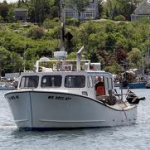 adership at the Commerce Department to the White House. ”I have not heard one word about fisheries from the president,”said Paul “Sasquatch” Cohan, the Gloucester fisherman who announced at the Warren meeting in Gloucester that he had nothing left to fight with. “I wouldn’t give up, but now I have to give up,” said Cohan, who operated a gillnet day boat. Read more
adership at the Commerce Department to the White House. ”I have not heard one word about fisheries from the president,”said Paul “Sasquatch” Cohan, the Gloucester fisherman who announced at the Warren meeting in Gloucester that he had nothing left to fight with. “I wouldn’t give up, but now I have to give up,” said Cohan, who operated a gillnet day boat. Read more






